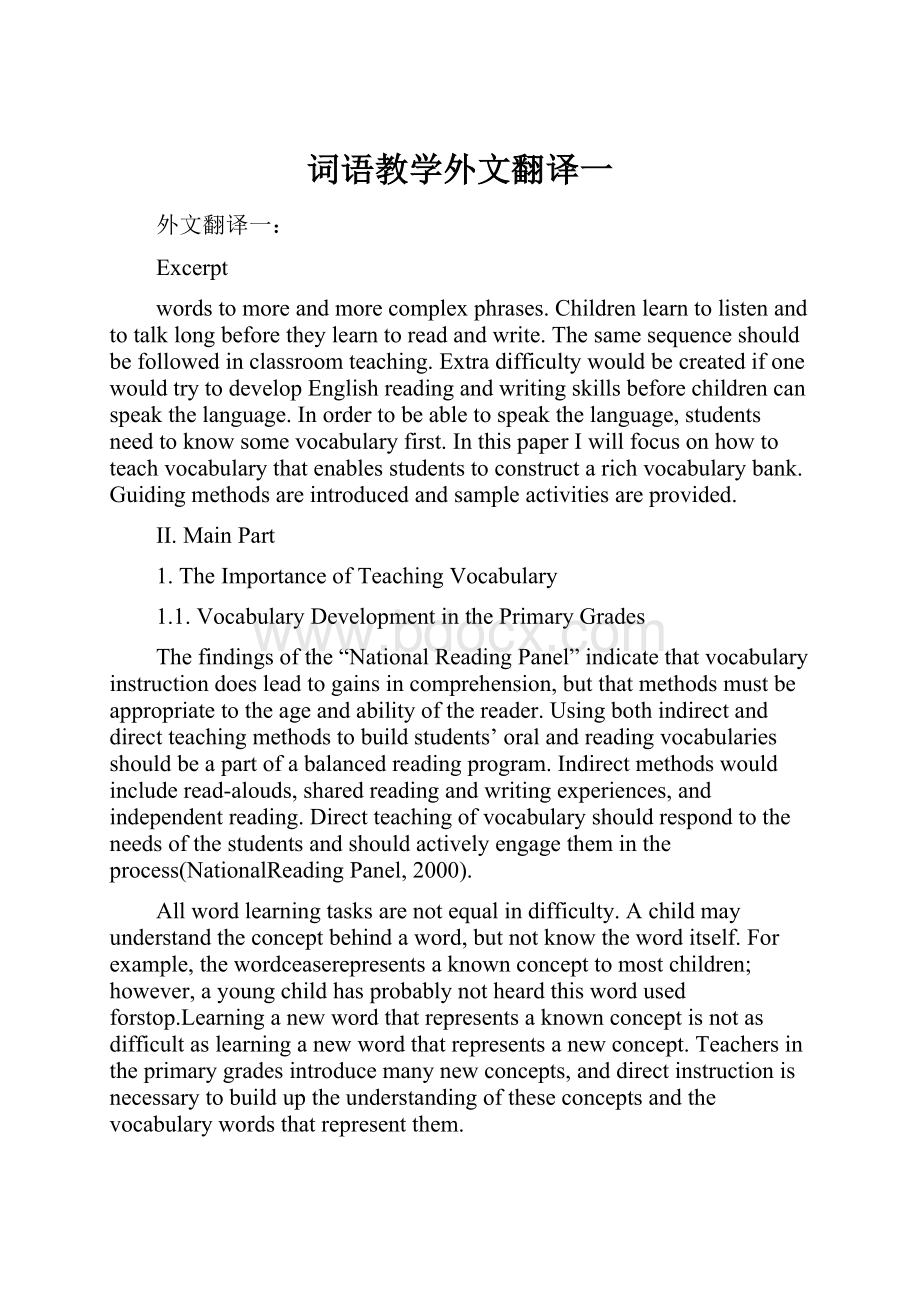词语教学外文翻译一.docx
《词语教学外文翻译一.docx》由会员分享,可在线阅读,更多相关《词语教学外文翻译一.docx(16页珍藏版)》请在冰豆网上搜索。

词语教学外文翻译一
外文翻译一:
Excerpt
wordstomoreandmorecomplexphrases.Childrenlearntolistenandtotalklongbeforetheylearntoreadandwrite.Thesamesequenceshouldbefollowedinclassroomteaching.ExtradifficultywouldbecreatedifonewouldtrytodevelopEnglishreadingandwritingskillsbeforechildrencanspeakthelanguage.Inordertobeabletospeakthelanguage,studentsneedtoknowsomevocabularyfirst.InthispaperIwillfocusonhowtoteachvocabularythatenablesstudentstoconstructarichvocabularybank.Guidingmethodsareintroducedandsampleactivitiesareprovided.
II.MainPart
1.TheImportanceofTeachingVocabulary
1.1.VocabularyDevelopmentinthePrimaryGrades
Thefindingsofthe“NationalReadingPanel”indicatethatvocabularyinstructiondoesleadtogainsincomprehension,butthatmethodsmustbeappropriatetotheageandabilityofthereader.Usingbothindirectanddirectteachingmethodstobuildstudents’oralandreadingvocabulariesshouldbeapartofabalancedreadingprogram.Indirectmethodswouldincluderead-alouds,sharedreadingandwritingexperiences,andindependentreading.Directteachingofvocabularyshouldrespondtotheneedsofthestudentsandshouldactivelyengagethemintheprocess(NationalReadingPanel,2000).
Allwordlearningtasksarenotequalindifficulty.Achildmayunderstandtheconceptbehindaword,butnotknowtheworditself.Forexample,thewordceaserepresentsaknownconcepttomostchildren;however,ayoungchildhasprobablynotheardthiswordusedforstop.Learninganewwordthatrepresentsaknownconceptisnotasdifficultaslearninganewwordthatrepresentsanewconcept.Teachersintheprimarygradesintroducemanynewconcepts,anddirectinstructionisnecessarytobuilduptheunderstandingoftheseconceptsandthevocabularywordsthatrepresentthem.
Whenteachingvocabularywordsthatrepresentknownconcepts,theemphasisshouldalwaysbeonthecontextinwhichthewordappears.Discussingthemeaning
2
ofthewordfromthecontextofthereadingselectiontogetherwithsupplyingadefinitionofthewordwillhelptobuildmeaningforstudents.Ifstudentsaretoacquirethiswordaspartoftheirvocabulary,thentheymustbegivenrepeatedexposureofthewordinavarietyofcontexts.Theymustalsohaveopportunitiestopractiseusingthewordinconversationand/orwriting.
Bythetimechildrenentersecondgrade,theyarelikelytoknowbetween2,000and5,000vocabularywords.Thisamazinggrowthcontinuesthroughouttheelementaryyears,asmostchildrengain3,000-4,000newvocabularywordseachyearthattheycanreadandunderstand(TeachingReadinginthe21stCentury,2001).Byencouragingindependentreadingandprovidingbothindirectanddirectinstructioninvocabulary,studentscanbehelpedtodevelopthevocabularyknowledgetheywillneedforeffectivecomprehension.
1.2.EducatorsViewonTeachingVocabulary
"Teachingonewordatatimeoutofcontextistheworstwayofteachingvocabulary,withrapidforgettingalmostguaranteed,"assertsFrankSmith,authorof"TheBookofLearningandForgetting"(1998),recentlypublishedbyTeachersCollegePress.AccordingtoSmith,peopleassimilatenewvocabularywordsfromcontextthefirsttimetheyreadthem,"providedthatthegistofthematerialbeingreadisbothinterestingandcomprehensible.Withinfivemoreencounters,thewordanditsconventionalmeaningareusuallyfirmlyestablishedinthemindofthereader."
Othereducatorswhosharethisviewaddthatwhenreadingmaterialisn'tinstantlyinterestingorcomprehensible,it'stheteacher'sjobtobuildcontextbyactivatingstudents'priorknowledgeofthetopic.Withregardtovocabulary,thatmeanshavingstudentsidentifydifficultwordsthemselvesandpooltheirknowledgetogetthemeaning.AnnMarieLongo,directoroftheBoysTownReadingCenter,arguesthatteenscan'tusecontexteffectivelywhentheirvocabulariesarelimited.Limitedvocabularyisthemostcommonproblemamongweakreadersshe'sworkedwith.Longobeginswithindirectinstructioninwordsandtheirmeaningsandthenprovideshigh-interestopportunitiestousethewords.VocabularyexpertIsabelBeckoftheUniversityofPittsburghembracesbothapproaches.Forher,thereare
3
fourwaystolearnvocabulary:
widereading,hearingunfamiliarwordsinspeech,directinstructioninwordsand"gimmicks"tobooststudents'interest.
Becksuggeststeachersincorporatedifficultwordsintotheirclassroomroutinesandencouragestudentstolookforthewordsinreadingoutsideclass.Longoagreesthatstudentsneedtoputnewwordstouseinwritingandconversationaswellasreading."Forvocabularyinstructiontoincreasecomprehension,"saysLongo,"youhavetoseethosewordsoverandoveragain"(WhenAdolescentsCan´tRead:
MethodsandMaterialsthatWork,1999).
1.3.MemoryandStorageSystems
Understandinghowourmemoryworksmighthelpuscreatemoreeffectivewaystoteachvocabulary.Researchinthearea,citedbyGairnsandRedman(1986)offersussomeinsightsintothisprocess.Itseemsthatlearningnewitemsinvolvestoringthemfirstinourshort-termmemory,andafterwardsinlong-termmemory.Wedonotcontrolthisprocessconsciouslybutthereseemtobesomeimportantcluestoconsider.First,retentioninshort-termmemoryisnoteffectiveifthenumberofchunksofinformationexceedsseven.Therefore,thissuggeststhatinagivenclassweshouldnotaimatteachingmorethanthisnumber.However,ourlong-termmemorycanholdanyamountofinformation.
Researchalsosuggeststhatour“mentallexicon”ishighlyorganisedandefficient,andthatsemanticrelateditemsarestoredtogether.Wordfrequencyisanotherfactorthataffectsstorage,asthemostfrequentlyuseditemsareeasiertoretrieve.Wecanusethisinformationtoattempttofacilitatethelearningprocess,bygroupingitemsofvocabularyinsemanticfields,suchastopics(e.g.typesoffruit).Oxford(1990)suggestsmemorystrategiestoaidlearning,andthesecanbedividedintocreatingmentallinkages(grouping,associating,placingnewwordsintoacontext),applyingimagesandsounds(usingimagery,semanticmapping,usingkeywordsandrepresentingsoundsinmemory),reviewinginastructuredwayandemployingaction(physicalresponseorsensation,usingmechanicaltechniques).Thetechniquesjustmentionedcanbeusedtogreateradvantageifwecandiagnoselearningstylepreferences(visual,aural,kinesthetic,tactile)andmakestudentsawareofdifferentmemorystrategies.
4
Meaningfultasks,however,seemtoofferthebestanswertovocabularylearning,astheyrelyonstudents’experiencesandrealitytofacilitatelearning.Moremeaningfultasksalsorequirelearnerstoanalyseandprocesslanguagemoredeeply,whichshouldhelpthemretaininformationinlong-termmemory.Forgettingseemstobeaninevitableprocess,unlesslearnersregularlyuseitemstheyhavelearnt.Therefore,recyclingisvital,andideallyitshouldhappenoneortwodaysaftertheinitialinput.Afterthat,weeklyormonthlytestscancheckonpreviouslytaughtitems.Thewaystudentsstoretheitemslearnedcanalsocontributetotheirsuccessorfailureinretrievingthemwhenneeded.Mostlearnerssimplylisttheitemslearntinchronologicalorder,indicatingmeaningwithtranslation.Thissystemisfarfromhelpful,asitemsarede-contextualised,encouragingstudentstoovergeneralisetheirusage.Itdoesnotallowforadditionsandrefinementsnordoesitindicatepronunciation.Teacherscanencouragelearnerstouseothermethods,usingtopicsandcategoriestoorganiseanotebook,binderorindexcards.MeaningshouldbestoredusingEnglishasmuchaspossible.Diagramsandwordtreescanalsobeusedwithinthistopic/categoriesorganisation.Theclassasawholecankeepavocabularyboxwithcards,whichcanbeusedforrevision/recyclingregularly.
1.4.WhyVocabularyisImportant
Teachersmaywonderwhyitisimportanttoteachvocabulary.Well,thereisaveryclearanswertothatquestion,namelythatvocabularyiscriticaltoreadingsuccessforthreereasons,whichIwillexplainnowbriefly.Firstofall,comprehensionimproveswhenyouknowwhatthewordsmean.Sincecomprehensionistheultimategoalofreading,youcannotoverestimatetheimportanceofvocabularydevelopment.Secondly,wordsarethecurrencyofcommunication.Arobustvocabularyimprovesallareasofcommunicationwhicharelistening,speaking,readingandwriting.Lastbutnoleast,whenchildrenandadolescentsimprovetheirvocabulary,theiracademicandsocialconfidenceandcompetenceimprove,too.
Inturn,adeficitinvocabularyknowledgecausescomprehensionproblems,andcomprehensionproblemspreventpeoplefromimprovingtheirvocabularyknowledgeontheirown.Intensivevocabularyinstructioncanbeeffectiveinturningthissituationaround.Whatisrequired,though,isaclearanddeliberatefocusonfacilitatingstudents’creationofmeaningfulcontextsforthewordmeaningstheyarelearning,
5
andafrequentandconsistentemphasisonhelpingthemmakeconnectionstowhattheyalreadyknow.
1.5.LevelsofWordKnowledge
“Wordknowledge”referstohowwellyouknowthemeaningofaword.Researchshowsthattherearethreekindsofwordknowledge.Firstly,thereisalackofwordknowledgewherethemeaningiscompletelyunfamiliar.Secondly,thereisacquiredwordknowledgewherethebasicmeaningisrecognizedaftersomethought.Andlast,thereisestablishedwordknowledgewherethemeaningiseasily,rapidlyandautomaticallyrecognized(Beck,McKeown,andOmanson,1987).Wordsfromthethirdcategoryarealreadyestablishedinthepersonalvocabularybankandare